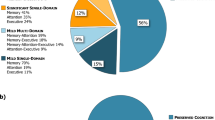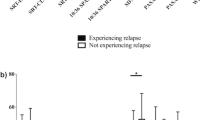Abstract
Background
Cognitive impairment is a debilitating symptom experienced by ~ 50% of multiple sclerosis patients, with processing speed (PS) and memory most affected. Until now, the field has considered cognition in a binary fashion: patients are designated as impaired or not impaired. This designation is typically arrived at by administering a full cognitive battery and assigning a cutoff (e.g., 4 of 11 tests failed) to distinguish impaired/non-impaired. This relatively coarse approach yields a heterogeneous group of “impaired” patients, some of whom may have isolated memory or PS deficits, others with combined deficits. The goal of this study is to determine whether predominant patterns of deficits, “cognitive phenotypes”, can be identified in a large sample of MS patients. Proportional representation of four cognitive phenotypes will be evaluated: (1) not impaired, (2) PS-impaired only, (3) memory-impaired only, (4) PS + memory impaired.
Methods
Cognition was measured in 128 relapsing–remitting MS patients using validated tests of verbal/visual memory, and PS. Cognitive phenotype representation was evaluated. Differences in age, education, disease duration, and IQ across cognitive phenotype groups were evaluated.
Results
Four cognitive phenotype groups were represented: 56.3% not impaired, 7.8% PS-impaired, 18.8% memory-impaired, 17.2% PS + memory impaired. Across groups, there were no differences in age, education, disease duration. IQ in non-impaired was higher than PS + memory impaired.
Conclusions
Adopting a novel classification taxonomy for cognitive phenotypes will advance understanding of cognitive impairment and enable a precision medicine approach to the development of effective, targeted treatments for cognition in persons with MS.

Similar content being viewed by others
References
Rao SM, Leo GJ, Bernardin L, Unverzagt F (1991) Cognitive dysfunction in multiple sclerosis. I. Frequency, patterns, and prediction. Neurology 41:685–691
Rao SM, Leo GJ, Ellington L et al (1991) Cognitive dysfunction in multiple sclerosis. II. Impact on employment and social functioning. Neurology 41:692–696
Chiaravalloti ND, DeLuca J (2008) Cognitive impairment in multiple sclerosis. Lancet Neurol 7:1139–1151. https://doi.org/10.1016/S1474-4422(08)70259-X
Benedict RH, Cookfair D, Gavett R et al (2006) Validity of the minimal assessment of cognitive function in multiple sclerosis (MACFIMS). J Int Neuropsychol Soc 12:549–558
Morrow SA, Drake A, Zivadinov R et al (2010) Predicting loss of employment over three years in multiple sclerosis: clinically meaningful cognitive decline. Clin Neuropsychol 24:1131–1145. https://doi.org/10.1080/13854046.2010.511272
Moore P, Harding KE, Clarkson H et al (2013) Demographic and clinical factors associated with changes in employment in multiple sclerosis. Mult Scler 19:1647–1654. https://doi.org/10.1177/1352458513481396
Patti F, Vila C (2014) Symptoms, prevalence and impact of multiple sclerosis in younger patients: a multinational survey. Neuroepidemiology 42:211–218. https://doi.org/10.1159/000360423
Wynia K, Middel B, van Dijk JP et al (2008) The impact of disabilities on quality of life in people with multiple sclerosis. Mult Scler 14:972–980. https://doi.org/10.1177/1352458508091260
Paparrigopoulos T, Ferentinos P, Kouzoupis A et al (2010) The neuropsychiatry of multiple sclerosis: focus on disorders of mood, affect and behaviour. Int Rev Psychiatry 22:14–21. https://doi.org/10.3109/09540261003589323
Habeck C, Gazes Y, Razlighi Q et al (2016) The Reference Ability Neural Network Study: life-time stability of reference-ability neural networks derived from task maps of young adults. Neuroimage 125:693–704. https://doi.org/10.1016/j.neuroimage.2015.10.077
Ontaneda D, Fox RJ, Chataway J (2015) Clinical trials in progressive multiple sclerosis: lessons learned and future perspectives. Lancet Neurol 14:208–223. https://doi.org/10.1016/S1474-4422(14)70264-9
Sumowski JF, Chiaravalloti N, Erlanger D et al (2011) L-amphetamine improves memory in MS patients with objective memory impairment. Mult Scler 17:1141–1145. https://doi.org/10.1177/1352458511404585
Polman CH, Reingold SC, Banwell B et al (2011) Diagnostic criteria for multiple sclerosis: 2010 revisions to the McDonald criteria. Ann Neurol 69:292–302. https://doi.org/10.1002/ana.22366
Mellion M, DeLuca J, Benedict R et al (2016) Establishing a normative data set for the MS-COG (P2.125). Neurology 86(P2):125
Benedict RHB. Personal communication, December 26, 2017
Golden CJ, Freshwater SM (1998) The Stroop color and word test. Stoelting Co., Wood Dale
Razlighi QR, Oh H, Habeck C et al (2016) Dynamic patterns of brain structure-behavior correlation across the lifespan. Cereb Cortex. https://doi.org/10.1093/cercor/bhw179
Sumowski JF, Benedict RHB, Enzinger C, Filippi M, Geurts JJ, Hamalainen P, Hulst H, Inglese M, Leavitt VM, Rocca MA, Rosti-Otajarvi EM, Rao S (2018) Cognition in multiple sclerosis: state of the field and priorities for the future. Neurology 90:1–11. https://doi.org/10.1212/WNL.000000000004977
Krupp L, Christodoulou C, Melville P, Al E (2004) Donepezil improved memory in multiple sclerosis in a randomized clinical trial. Neurology 63:1579–1585
Morrow SA, Kaushik T, Zarevics P et al (2009) The effects of l-amphetamine sulfate on cognition in MS patients: results of a randomized controlled trial. J Neurol 256:1095–1102. https://doi.org/10.1007/s00415-009-5074-x
Benedict RHB, Munschauer F, Zarevics P et al (2008) Effects of l-amphetamine sulfate on cognitive function in multiple sclerosis patients. J Neurol 255:848–852. https://doi.org/10.1007/s00415-008-0760-7
D’Amico E, Leone C, Hayrettin T, Patti F (2016) Can we define a rehabilitation strategy for cognitive impairment in progressive multiple sclerosis? A critical appraisal. Mult Scler J 22:581–589
Amato MP, Ponziani G, Siracusa G, Sorbi S (2001) Cognitive dysfunction in early-onset multiple sclerosis: a reappraisal after 10 years. Arch Neurol 58:1602–1606
Acknowledgements
Funding for this work was provided in part by the National Multiple Sclerosis Society (RG-1508-05892, Leavitt). The authors would like to thank Kunal Shah for database assistance.
Author information
Authors and Affiliations
Corresponding author
Ethics declarations
Conflicts of interest
The authors declare no conflicts of interest. Research support for this project was provided in part by the National Multiple Sclerosis Society (RG4810A1/1 to VML).
Ethical standards
This study was approved by the institutional review board at Columbia University Medical Center and was performed in accordance with the ethical standards for human subjects research.
Rights and permissions
About this article
Cite this article
Leavitt, V.M., Tosto, G. & Riley, C.S. Cognitive phenotypes in multiple sclerosis. J Neurol 265, 562–566 (2018). https://doi.org/10.1007/s00415-018-8747-5
Received:
Revised:
Accepted:
Published:
Issue Date:
DOI: https://doi.org/10.1007/s00415-018-8747-5




